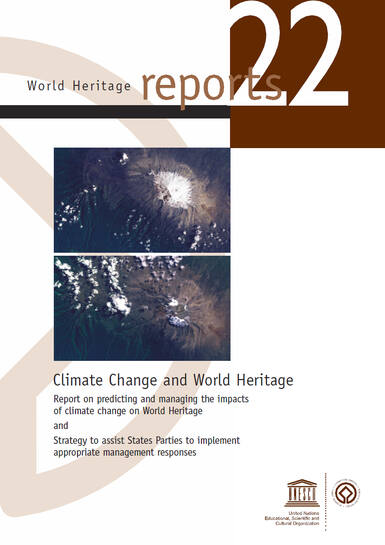Climate Change and World Heritage
Climate Change and World Heritage
World Heritage Series n°22
Tuesday, 1 May 2007
The 1972 UNESCO World Heritage Convention is the principal instrument for identifying and protecting, for the benefit of current and future generations, the outstanding natural and cultural heritage of the world, and encouraging international cooperation for its conservation. Climate change has now emerged as one of the most serious threats impacting on the conservation of this heritage.
The World Heritage Committee has recognized this emerging threat and responded at its 29th session by launching an initiative to assess the impacts of climate change impacts on World Heritage and define appropriate management responses. Accordingly, a meeting of experts was held in March 2006 in order to prepare a Report and a Strategy to assist States Parties in addressing this threat, and these documents were endorsed by the Committee at its 30th session in July 2006. The fact that climate change poses a threat to the outstanding universal values of World Heritage sites has several implications for the 1972 Convention. Lessons learnt at some sites show the relevance of designing and implementing appropriate adaptations measures. Research at all levels would also have to be promoted in collaboration with the various bodies involved in climate change work, especially for cultural heritage where the level of involvement of the scientific community needs to be enhanced.
The global network of World Heritage sites is ideally suited to build public awareness and support through sharing of information and effective communication on the subject, given the high-profile nature of these sites.
Protecting and managing World Heritage sites in a sustainable and effective manner is a shared responsibility under the Convention. Therefore, there is a need to publicize all available information on the threats posed by climate change and the potential measures for dealing with them. This publication in the World Heritage Papers Series, comprising the report on ’Predicting and managing the effects of climate change on World Heritage’ and a ’Strategy to assist States Parties to implement appropriate management responses’ is part of that overall effort.
UNESCO’s World Heritage Centre is committed to working closely with all stakeholders including the States Parties to the 1972 Convention, other international conventions and organizations, the civil society and the scientific community to address the multiple challenges posed by climate change to the precious and fragile cultural and natural heritage of the world.
Table of Contents
Background
- Introduction
- Overview of climate change
Predicting and managing the impacts of climate change on World Heritage
- Impacts of climate change on natural and cultural World Heritage
- Implications for the World Heritage Convention
- What can be done with respect to climate change and World Heritage?
Strategy to assist States Parties to implement appropriate
management responses
- Preamble: Objectives and requirements
- Preventive actions
- Corrective actions: Management, adaptation, and risk management
- Collaboration, cooperation, and sharing best practices and knowledge
- Legal issues
Conclusion and steps ahead
World Heritage Centre
